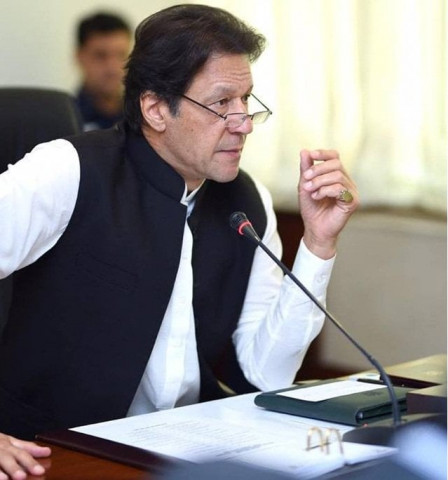PTI govt wary as economic situation may aggravate
It is trying to impose fiscal and financial discipline to bring country back on track

Prime Minister Imran Khan. PHOTO: PID
The current account deficit went down from 6.3% in fiscal year 2017-18 to 4.8% in 2018-19. Despite a massive depreciation of the rupee, the export growth remained negative, though imports were compressed by around 7%.
The new government embarked slowly on the stabilisation route to avoid political backlash. Although it treaded the path gradually, the axe fell on the development budget.
Axing this budget brought down tax revenue for the Federal Board of Revenue (FBR) since the government spends first and then collects revenue. That is the reason the International Monetary Fund (IMF) recommends that the government should step up its development spending under the Extended Fund Facility (EFF).
However, the new government is quite conservative in its approach to loosening the purse strings on development expenditure. The accountability drive is also keeping civil servants at bay. This cautious approach will aggravate the economic situation going forward.
The State Bank of Pakistan (SBP) has adopted an aggressive stance in raising the policy rate in quick successions. Now the policy rate is 13.25%, which will create problems for the dominant borrower ie the government. Under the EFF, the government has started borrowing from commercial banks, which will further increase the cost of borrowing.
In addition, the banks will start parking their liquidity in treasury bills and bonds. This type of borrowing pattern started in 2008 since banks became risk averse owing to adverse economic circumstances.
Since 2008, the successive governments have remained under the IMF programmes and they have resorted to commercial bank borrowing, which not only increased their cost of borrowing, but also reduced the fiscal space. Furthermore, this also shows that the government has been serving the financial interest since banks do not invest in real sectors of the economy. As a result, the financial sector progresses at the cost of real sector. Firms operating in the real sector of the economy resort to borrowing when they expect the economy to improve in future. Owing to high interest rates, the firms become cautious in their investment decisions. For them, the high cost of borrowing will make many projects unprofitable.
Banks also become wary of the fact that many firms will not be able to make interest payments and there are chances of default on repayment of principal amounts.
The SBP has been trying to fight inflation through demand compression, which is not a prudent approach. In a developing economy such as Pakistan, the efficacy of monetary instruments can be called into question since most of the economic activities take place in the informal sector. In the informal sector, cash transactions are normal. Though the government is trying hard to encourage banking transactions, it will be difficult to implement it in letter and spirit.
The SBP has increased the policy rate to a level, which is not justifiable at the moment. Though the headline inflation is in double digits, the core inflation is still around 8%.
It may be argued that headline inflation will further increase in the coming months and even the impact of imported inflation will be felt in future due to around 52% depreciation of the rupee in the last 20 months. Despite all these, the SBP could have moved gradually to increase the policy rate.
In short, the economy is in the grip of macroeconomic stabilisation. The government is trying to impose fiscal and financial discipline, which could have been negotiated with the IMF. Now the real test for the government is to manage the popular sentiment.
The writer is the Assistant Professor of Economics at SDSB, Lahore University of Management Sciences (LUMS)
Published in The Express Tribune, August 19th, 2019.
Like Business on Facebook, follow @TribuneBiz on Twitter to stay informed and join in the conversation.



















COMMENTS
Comments are moderated and generally will be posted if they are on-topic and not abusive.
For more information, please see our Comments FAQ